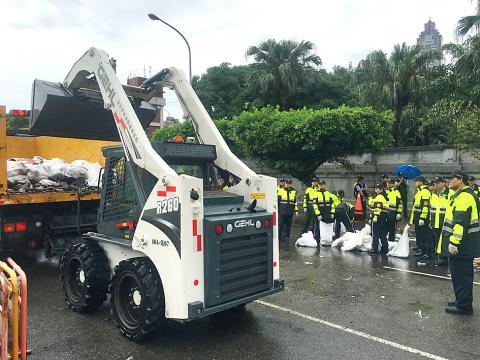Aboriginal protesters were evicted from their campsite on Ketagalan Boulevard in Taipei yesterday following repeated conflicts with the police over blocking road lanes during their 100-day occupation.
More than 100 police officers arrived at the site during yesterday’s torrential rains, surrounding protesters’ tents with metal roadblocks before forcing protestors outside, spending several hours methodically demolishing the site.
A handful of demonstrators affiliated with the Aboriginal Transitional Justice Classroom have been occupying the strip of road facing the Presidential Office Building since February to protest newly announced guidelines for demarcating the “traditional areas” within which Aboriginal communities would be able to reject further development.

Photo: Cheng Hung-ta, Taipei Times
While government guidelines only call for demarcating public lands, protesters maintain that private land should also be included.
“I really do not understand why the government chose to evict us today when there is so much flooding to attend to — is there really that much hatred between us and [President] Tsai Ing-wen (蔡英文)?” Aboriginal protester Nabu, a Bunun, told a news conference outside police roadblocks as the final pile of debris was being loaded into trucks for disposal.
“We will keep fighting and continue to live on the road,” singer-activist Panai Kusui, an Amis, said.
During the occupation, police had repeatedly cleared the road, only to see protesters expand from their sidewalk tents, using plastic chairs, painted rocks, a dugout canoe and other objects to block multiple lanes.
“We hope the Democratic Progressive Party [DPP] will stop using violence before it runs off a cliff,” said New Power Party (NPP) Legislator Kawlo Iyun Pacidal, an Amis, who joined the protesters.
The clearing of the site made it difficult to believe there was any chance demarcation guidelines would be revised and land rights returned, she said.
NPP Legislator Freddy Lim (林昶佐) criticized the DPP for dragging its feet in passing promised amendments to the Assembly and Parade Act (集會遊行法) to improve protesters’ rights.
Police said that the protesters were removed on the grounds that they had failed to apply for usage rights of the road.

The manufacture of the remaining 28 M1A2T Abrams tanks Taiwan purchased from the US has recently been completed, and they are expected to be delivered within the next one to two months, a source said yesterday. The Ministry of National Defense is arranging cargo ships to transport the tanks to Taiwan as soon as possible, said the source, who is familiar with the matter. The estimated arrival time ranges from late this month to early next month, the source said. The 28 Abrams tanks make up the third and final batch of a total of 108 tanks, valued at about NT$40.5 billion

A group from the Taiwanese Designers in Australia association yesterday represented Taiwan at the Midsumma Pride March in Melbourne. The march, held in the St. Kilda suburb, is the city’s largest LGBTQIA+ parade and the flagship event of the annual Midsumma Festival. It attracted more than 45,000 spectators who supported the 400 groups and 10,000 marchers that participated this year, the association said. Taiwanese Designers said they organized a team to march for Taiwan this year, joining politicians, government agencies, professionals and community organizations in showing support for LGBTQIA+ people and diverse communities. As the first country in Asia to legalize same-sex

MOTIVES QUESTIONED The PLA considers Xi’s policies toward Taiwan to be driven by personal considerations rather than military assessment, the Epoch Times reports Chinese President Xi Jinping’s (習近平) latest purge of the Chinese People’s Liberation Army (PLA) leadership might have been prompted by the military’s opposition to plans of invading Taiwan, the Epoch Times said. The Chinese military opposes waging war against Taiwan by a large consensus, putting it at odds with Xi’s vision, the Falun Gong-affiliated daily said in a report on Thursday, citing anonymous sources with insight into the PLA’s inner workings. The opposition is not the opinion of a few generals, but a widely shared view among the PLA cadre, the Epoch Times cited them as saying. “Chinese forces know full well that

Travel agencies in Taiwan are working to secure alternative flights for travelers bound for New Zealand for the Lunar New Year holiday, as Air New Zealand workers are set to strike next week. The airline said that it has confirmed that the planned industrial action by its international wide-body cabin crew would go ahead on Thursday and Friday next week. While the Auckland-based carrier pledged to take reasonable measures to mitigate the impact of the workers’ strike, an Air New Zealand flight arriving at Taipei from Auckland on Thursday and another flight departing from Taipei for Auckland on Saturday would have to